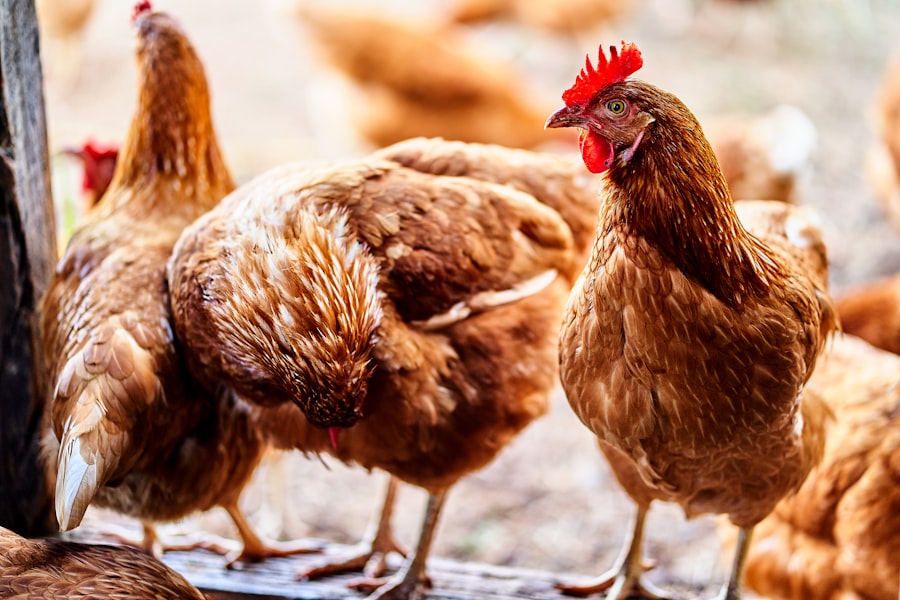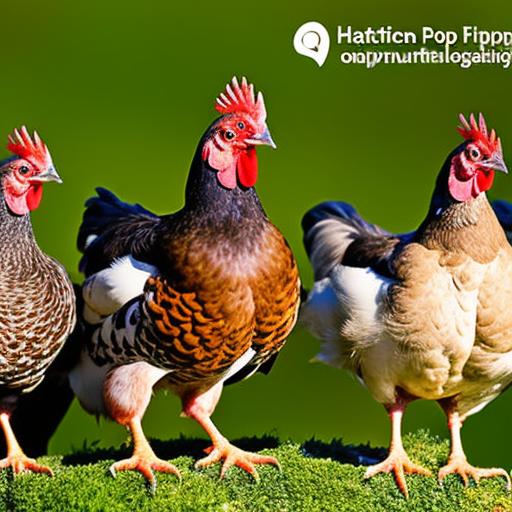Keeping chickens has a long history in the United Kingdom, dating back to the Victorian era when it became a popular hobby among the upper class. Today, keeping chickens has become increasingly popular among people of all backgrounds, as it offers a range of benefits. Not only do chickens provide a sustainable source of fresh eggs and meat, but they also make great pets and can be a fun and educational experience for families.
One of the main benefits of keeping chickens is the access to fresh eggs. Chickens are prolific layers, with some breeds capable of producing up to 300 eggs per year. This means that you can have a constant supply of fresh, organic eggs right in your backyard. In addition to being delicious, these eggs are also healthier than store-bought ones, as they are free from antibiotics and hormones.
Another benefit of keeping chickens is the opportunity to reduce food waste. Chickens are omnivorous and will happily eat kitchen scraps, such as vegetable peelings and leftovers. By feeding them these scraps, you can reduce the amount of waste that goes into landfills and also save money on chicken feed.
Key Takeaways
- Keeping chickens in the UK requires legal compliance with regulations and guidelines.
- Choosing the right chicken breed depends on your needs, such as egg production or meat.
- Building a chicken coop requires careful consideration of design, materials, and plans.
- Maintaining your chicken coop involves regular cleaning and repairs to ensure the health and happiness of your chickens.
- Keeping chickens in the UK can provide numerous benefits, such as fresh eggs and a fun hobby.
Legal Requirements for Keeping Chickens in the UK
Before you start keeping chickens, it’s important to familiarize yourself with the legal requirements in the UK. While there are no specific laws that prohibit keeping chickens, there are certain regulations that you need to adhere to.
Firstly, you may need to register your chickens with the Department for Environment, Food and Rural Affairs (DEFRA). This is especially important if you have more than 50 birds or if you plan on selling eggs or meat. Registration helps to prevent the spread of diseases such as avian influenza and ensures that your flock can be traced in case of an outbreak.
In addition to registration, you may also need to obtain a license if you plan on keeping more than a certain number of chickens. The exact number varies depending on your location, so it’s important to check with your local council or DEFRA for the specific requirements in your area.
Biosecurity measures are also important when keeping chickens. This includes keeping your chickens in a secure enclosure to prevent contact with wild birds and other animals, as well as practicing good hygiene by regularly cleaning and disinfecting the coop.
Choosing the Right Chicken Breed for Your Needs
When it comes to choosing a chicken breed, there are several factors to consider. Firstly, you need to decide whether you want a breed that is primarily for egg-laying or for meat production. Egg-laying breeds, such as the Rhode Island Red and the Sussex, are known for their high egg production and are a popular choice for backyard chicken keepers. Meat-producing breeds, such as the Cornish Cross and the Plymouth Rock, are bred specifically for their meat and grow at a faster rate.
Other factors to consider include the size of the breed, its temperament, and its ability to withstand different climates. Some breeds, such as the Orpington and the Wyandotte, are known for their friendly and docile nature, making them great pets for families with children. On the other hand, some breeds, such as the Leghorn and the Hamburg, are more flighty and independent.
Popular chicken breeds in the UK include the Sussex, the Orpington, and the Rhode Island Red. These breeds are known for their hardiness, good egg production, and friendly nature.
Building a Chicken Coop: Tips and Considerations
A good chicken coop is essential for keeping your chickens safe and healthy. When building a chicken coop, there are several tips and considerations to keep in mind.
Firstly, you need to choose a suitable location for your coop. It should be well-drained and away from any potential sources of contamination, such as standing water or areas where chemicals are stored. It should also be easily accessible for cleaning and maintenance.
The size of your coop will depend on the number of chickens you plan on keeping. As a general rule of thumb, each chicken should have at least 4 square feet of space inside the coop and 10 square feet of space in the outdoor run. This will ensure that they have enough room to move around and engage in natural behaviors, such as scratching and dust bathing.
Security is also an important consideration when building a chicken coop. It should be predator-proof, with sturdy walls and a secure roof to prevent entry by predators such as foxes and rats. The floor should be made of solid material, such as concrete or wood, to prevent digging by predators.
Chicken Coop Design: Factors to Consider
When designing a chicken coop, there are several factors to consider to ensure the comfort and well-being of your chickens.
There are several types of chicken coops to choose from, including traditional wooden coops, mobile coops, and converted sheds or outbuildings. Each type has its own advantages and disadvantages, so it’s important to choose one that suits your needs and preferences.
Ventilation is an important consideration when designing a chicken coop. Good ventilation helps to remove moisture and ammonia from the coop, which can lead to respiratory problems in chickens. It also helps to regulate temperature and prevent the buildup of odors.
Lighting is another important factor to consider. Chickens need natural light to lay eggs, so it’s important to provide them with access to sunlight or artificial lighting. A combination of natural and artificial lighting is ideal, as it helps to regulate their internal clock and promote healthy egg production.
Nesting boxes and roosting bars are also essential components of a chicken coop. Nesting boxes provide a safe and comfortable place for hens to lay their eggs, while roosting bars give them a place to perch and sleep at night. The size and number of nesting boxes and roosting bars will depend on the number of chickens you have.
Materials for Building a Chicken Coop

When it comes to building a chicken coop, there are several materials to choose from, each with its own pros and cons.
Wood is a popular choice for chicken coops due to its durability and natural insulation properties. It is also easy to work with and can be painted or stained to match your preferences. However, wood can be expensive and requires regular maintenance to prevent rotting and warping.
Metal is another option for chicken coops, particularly for the frame or roof. It is durable, easy to clean, and resistant to pests. However, metal can be noisy during heavy rain or hailstorms and may require additional insulation to regulate temperature.
Plastic is a lightweight and low-maintenance option for chicken coops. It is resistant to rotting, warping, and pests, making it a popular choice for backyard chicken keepers. However, plastic can be less durable than other materials and may not provide as much insulation.
Cost is also an important consideration when choosing materials for your chicken coop. Wood tends to be the most expensive option, while plastic and metal are generally more affordable. It’s important to weigh the cost against the durability and maintenance requirements of each material.
Chicken Coop Plans: Where to Find Them
If you’re not confident in your DIY skills or simply don’t have the time or resources to build a chicken coop from scratch, there are plenty of chicken coop plans available online.
There are many websites and online communities dedicated to backyard chicken keeping that offer free or paid chicken coop plans. These plans range from simple designs for small flocks to more elaborate designs for larger flocks.
When choosing a chicken coop plan, it’s important to consider factors such as the size of your flock, your budget, and your level of DIY experience. Some plans may require more advanced woodworking skills or specialized tools, while others may be suitable for beginners.
You can also find pre-built chicken coops for sale at garden centers, farm supply stores, and online retailers. These coops are often more expensive than DIY options but can save you time and effort in the construction process.
Maintaining Your Chicken Coop: Cleaning and Repairs
Regular cleaning and maintenance are essential for keeping your chicken coop in good condition and preventing the spread of diseases.
Cleaning should be done on a regular basis to remove droppings, feathers, and other debris from the coop. This can be done using a shovel or rake to scoop out the bedding material, followed by a thorough scrubbing with a mild detergent and water. It’s important to wear gloves and a mask when cleaning to protect yourself from bacteria and dust.
In addition to regular cleaning, you should also inspect your coop for any signs of damage or wear. Common repairs include fixing broken or loose boards, replacing damaged roofing material, and reinforcing doors and windows. It’s important to address these repairs as soon as possible to prevent further damage and ensure the safety of your chickens.
Regular maintenance also includes checking and replacing bedding material, providing fresh water and food, and monitoring the health of your chickens. It’s important to keep an eye out for any signs of illness or injury, such as lethargy, loss of appetite, or abnormal behavior.
Tips for Keeping Chickens Happy and Healthy
In addition to providing a clean and secure coop, there are several other tips for keeping your chickens happy and healthy.
Feeding and watering chickens is an important aspect of their care. Chickens require a balanced diet that includes a combination of commercial feed, kitchen scraps, and access to fresh grass and insects. It’s important to provide them with a constant supply of clean water, as dehydration can lead to health problems.
Health and hygiene considerations are also important when keeping chickens. Regularly inspecting your chickens for signs of illness or injury and seeking veterinary care when necessary is essential for their well-being. It’s also important to practice good hygiene by washing your hands after handling chickens and disinfecting equipment and tools.
Socialization and entertainment are also important for keeping chickens happy. Chickens are social animals and enjoy the company of their flockmates. Providing them with plenty of space to roam, perches to roost on, and toys or treats to peck at can help to keep them entertained and prevent boredom.
Enjoying the Benefits of Keeping Chickens in the UK
Keeping chickens in the UK offers a range of benefits, from a sustainable source of fresh eggs and meat to the joy of having pets that provide companionship and entertainment. By following the legal requirements, choosing the right breed, building a suitable coop, and providing proper care and maintenance, you can enjoy all the benefits that come with keeping chickens.
Whether you’re a beginner or an experienced chicken keeper, there are plenty of resources available to help you get started or improve your skills. Books, websites, and online communities dedicated to backyard chicken keeping can provide valuable information and support.
So why not consider keeping chickens in the UK? With a little bit of planning and preparation, you can enjoy the rewards of fresh eggs, a sustainable lifestyle, and the joy of having these charming creatures in your backyard.
If you’re interested in keeping chickens in the UK, you may also want to check out this informative article on what vegetables quails eat. Quails are small birds that can be a great addition to your backyard flock, and knowing what vegetables they enjoy can help provide them with a balanced diet. To learn more about this topic, visit https://poultrywizard.com/keeping-quail/what-vegetables-do-quails-eat/. Additionally, if you’re looking for tips on the floor of your chicken coop, this article provides useful insights on the different options available. Discover how to create a comfortable and clean environment for your chickens by visiting https://poultrywizard.com/keeping-chickens/floor-of-chicken-coop/. Lastly, if you’re feeling creative and want to build a unique chicken coop, the Hannah Montana Chicken Coop article offers inspiration and ideas. Find out how to create a fun and functional coop that your chickens will love at https://poultrywizard.com/keeping-chickens/hannah-montana-chicken-coop/.
FAQs
What are the rules and regulations for keeping chickens in the UK?
In the UK, there are rules and regulations that must be followed when keeping chickens. These include registering your chickens, providing adequate housing and space, and ensuring their welfare needs are met.
Do I need a license to keep chickens in the UK?
No, you do not need a license to keep chickens in the UK. However, you must register your chickens with the Department for Environment, Food and Rural Affairs (DEFRA) if you have 50 or more birds.
How much space do chickens need?
Chickens need a minimum of 1 square metre of space per bird in their coop, and at least 10 square metres of outdoor space per bird. However, more space is always better for their welfare.
What do chickens eat?
Chickens are omnivores and eat a variety of foods, including grains, seeds, fruits, vegetables, and insects. It is important to provide them with a balanced diet that meets their nutritional needs.
What are the benefits of keeping chickens?
Keeping chickens can provide a source of fresh eggs, as well as being a fun and educational hobby. Chickens also help to control pests in the garden and produce nutrient-rich fertilizer for plants.
Meet Walter, the feathered-friend fanatic of Florida! Nestled in the sunshine state, Walter struts through life with his feathered companions, clucking his way to happiness. With a coop that’s fancier than a five-star hotel, he’s the Don Juan of the chicken world. When he’s not teaching his hens to do the cha-cha, you’ll find him in a heated debate with his prized rooster, Sir Clucks-a-Lot. Walter’s poultry passion is no yolk; he’s the sunny-side-up guy you never knew you needed in your flock of friends!







